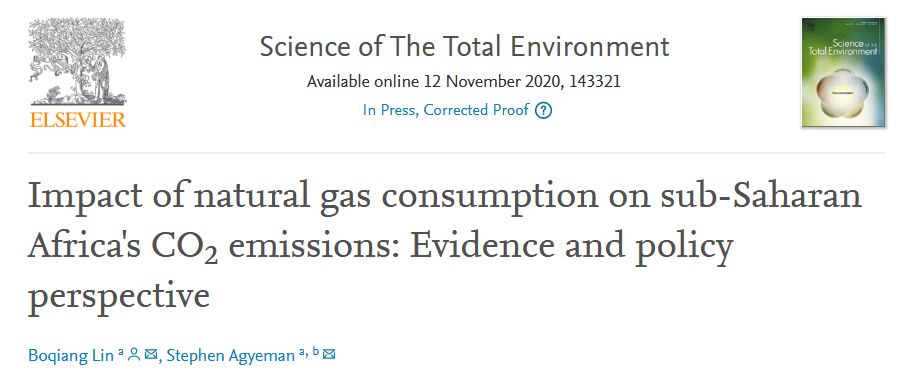
题目:天然气消费对撒哈拉以南非洲二氧化碳排放的影响:证据和政策视角 (Impact of natural gas consumption on sub-Saharan Africa's CO2 emissions: Evidence and policy perspective)
作者:林伯强*,Stephen Agyeman
期刊:Science of The Total Environment
详细:2020年11月,143321
DOI:https://doi.org/10.1016/j.scitotenv.2020.143321
文献导读:
撒哈拉以南非洲(SSA)是目前全球二氧化碳排放量最低的地区,但也是未来几十年二氧化碳排放量上升潜力较大的发展中地区之一。到2050年,该地区人口或将增加10亿人,预计将进一步刺激地区能源消耗量的提高。
为减少二氧化碳排放量,非洲需要寻找比煤炭和石油更清洁的能源形式。然而,太阳能、风能、潮汐等非水力可再生能源在SSA中所占的份额仅为1%(2016年),并且其在生产成本和产能方面存在明显挑战。天然气消费产生的二氧化碳排放量几乎比煤炭少50%,使得天然气成为SSA当前更为可行的选择。
在此背景下,本文试图回答以下问题:(1)天然气消费(以及其他关键驱动因素)与SSA二氧化碳排放量之间是否存在线性和非线性关系?(2) 燃料间替代弹性和技术进步差异是否也会通过天然气消耗间接影响二氧化碳排放?(3)SSA的天然气、煤炭和石油的替代弹性和技术进步差异趋势如何?(4) 考虑到燃料间替代弹性,加大对天然气消费的投资是否为SSA提供了一条节能减排的可行性途径?(5) SSA成员国的天然气发展情况如何?
Abstract: With huge natural gas(NG) reserves and current low (1%) share of non-hydro renewables in Sub-Saharan Africa (SSA), can natural gas offer SSA a low-carbon energy transition? Employing data from 1980 to 2017, this paper investigates the impact of NG consumption on SSA's CO2 emissions using data-driven nonparametric additive regression(NPAR) which can reveal both linear and nonlinear effects. Augmenting NPAR with translog production function(TPF) estimates of interfuel substitution elasticities and bias technological progress over sample period(advantage of TPF), we further provide evidence of the indirect effect of NG consumption on SSA's CO2 emissions through mechanism analysis. From the empirical results, the linear effect shows NG positively impact CO2 emissions while the nonlinear effect indicates a downward decreasing trend (meaning expansion in NG consumption will gradually lower CO2 emissions). Nonlinearly, urbanization and energy efficiency also show positive “inverted U-Shaped” and “downward slopping” respectively meaning sustainable urban energy and energy efficiency practices improvement can lead to CO2 reduction respectively in SSA. The reducing effect of NG consumption on CO2 (the nonlinear effect) is realized through the enhancement of positive bias technological progress of NG over coal and oil but not merely substitution of coal and oil for NG. Technological progress improvement in NG use will also reduce the positive linear effect of urbanization and energy efficiency on CO2 emissions of SSA. Oil is more likely to be substituted for NG than that of coal in SSA. The scenario analysis shows a total of 6.9%, 7.6% and 8.3% of energy conservation is realized in 2022, 2026 and 2030 with a corresponding CO2 reduction of 18.7%, 20.7% and 22.9% respectively for a continuous 10% investment in NG. Institutional, market-oriented and technology challenges hinder NG development among major producers in SSA. Based on the results, several policy measures are put forward to promote SSA's low-carbon energy transition.
Keywords: Natural gas consumption; CO2 emissions; Sub-Saharan Africa; Nonparametric additive regression; Inter-fuel-substitution elasticity; Technological progress bias
 厦大总机:0592-2180000
|
地址:福建省厦门市思明区思明南路422号
|
邮政编码:361005
厦大总机:0592-2180000
|
地址:福建省厦门市思明区思明南路422号
|
邮政编码:361005